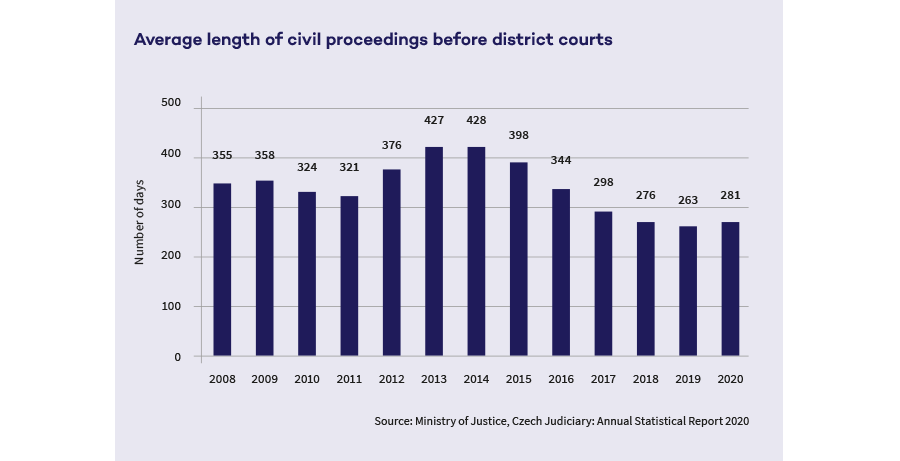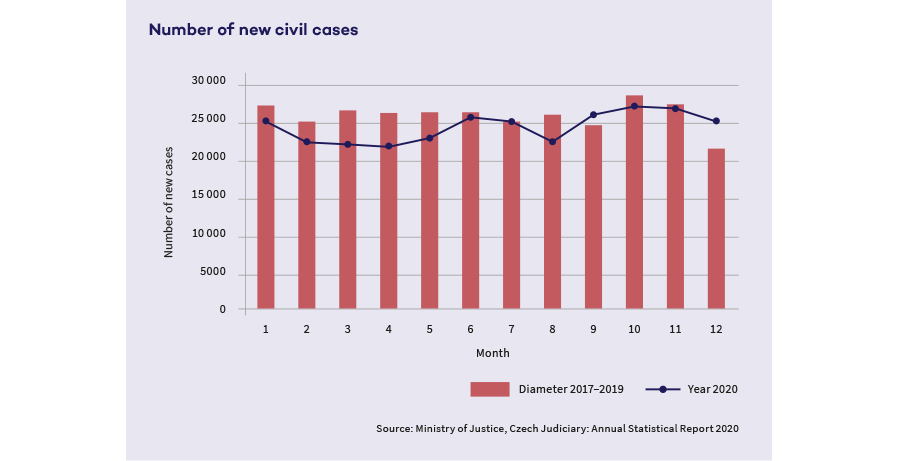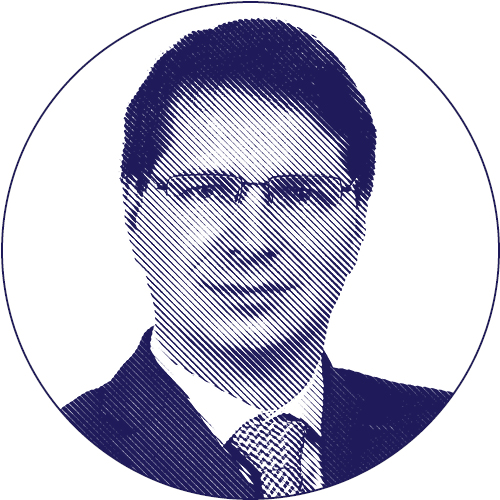In 2020, almost the entire state administration slowed down because of the pandemic, and the courts were no exception. Civil proceedings in district courts took an average of over nine months, according to statistics, a total of 18 days longer than the previous year. Even though the courts managed to return to working order relatively quickly after a few weeks of the harshest restrictions, the Czech justice system still needs to speed up.
According to court statistics, there were fewer new litigation matters in 2020 due to the pandemic, but court proceedings took longer. According to the annual report on the state of the Czech justice system published by the Ministry of Justice, the length of civil proceedings increased to 281 days in 2020. In the preceding year, it was 263 days.
Meanwhile, since 2015, the courts have sped up and managed to reduce the length of hearings every year. The lengthening can be attributed, at least partially, to the COVID-19 pandemic. The paradox, however, is that in 2020, courts addressed fewer litigation matters. However, they did not resolve as many as in previous years, which, especially in the courts of first instance, led to prolonged proceedings.

There was a noticeable decline in the number of civil litigation cases, particularly in the spring of 2020. In the normal course of operation between 2017 and 2019, there was a significant increase in new cases in the month of March, while in 2020, new cases declined. District courts initiated 4,000 to 5,000 fewer new cases per month during that period than in previous years.
But even though judges had fewer cases on their desks, they could not do their jobs as they were accustomed to in a time of constraint. For a time, in-person hearings virtually stopped, judges moved home from their offices, and what the courts did not manage in the spring was hard to make up afterwards. New cases usually decline toward the end of the year, but in December 2020, new cases were nearly 16% higher than the average for the past 5 years.

There’s a lot to work on
Compared to EU countries, however, the Czech courts are not that bad and have long been in the top quarter of countries in terms of the length of litigation matters. In the countries at the "bottom of the table" – Spain, Italy, Malta and France – litigation matters last on average three times longer. In the Netherlands or Lithuania, on the other hand, the courts act even faster and the average length of disputes there is often less than 100 days. So, there is still room for improvement.
The Civil Procedure Code – the procedural rules governing the courts – has not undergone a comprehensive reform since 1989, unlike other codes such as the Civil Code or the Criminal Code. This may also be one of the reasons why many cases have not been handled efficiently.
Complex commercial cases almost always take considerably longer than the reported average length of proceedings of around nine months.
However, the pandemic has had one positive effect: the courts and other institutions such as prosecutors' offices and prisons have finally taken videoconferencing in their good graces and started to make more use of it. During the first state of emergency in 2020, the volume of videoconferences was considerable - over 8,000. So, if the courts get used to online proceedings and continue to use them in the future, it could push the Czech justice system forward again and speed up the whole process.
Commercial disputes need specialists
Complex commercial disputes, which we deal with most often at HAVEL & PARTNERS, are not covered by the figures from the mentioned statistics. However, we know from our experience that complex commercial cases almost always take much longer than the average length of proceedings of around 9 months. There are several factors that delay complex commercial disputes. We consider as the most pressing problem in practice the fact that the judge is not always purposeful in heading towards a judgment. The party that is pulling the short end of the stick in a dispute often abuses various procedural tools to prolong the court proceedings. These may be unfounded objections of local or subject matter jurisdiction, objections of bias, additional interveners, motions for exemption from court fees, etc.
A good judge will detect and reject such tactics. This does not always happen. Proceedings are then prolonged and made more expensive – witnesses tend to be ill and the hearing is adjourned because of them, and after one expert opinion a second and a third revisions are proposed. In any case, it is always a question of finding a balance in individual cases. A number of judges are doing well, and the overall trend is improving.
Even so, the question is whether commercial disputes deserve more specialisation. They could be tried by specialised judges who do not try divorce cases in the morning and, for example, a complex, in terms of evidence and knowledge, construction liability case involving billions of crowns in the afternoon.
Clearly, concisely, understandably
Compared to the Western world, our culture of legal writing is still lagging behind, and litigation is based on it. However, legal texts do not always meet the high standards of quality and clarity that should be a matter of course.
At HAVEL & PARTNERS, we have colleagues with doctorates from prestigious foreign universities who have long focused on the comprehensible writing of legal texts. We strive to write concisely, factually and persuasively, and also systematically teach this to our junior colleagues. We are convinced that the Czech judiciary as a whole will benefit from the gradual cultivation that is already taking place, which to some extent involves a generational change. In our experience, the direction is positive.
Arbitration as an alternative
There is also an alternative in the field of commercial dispute resolution. If you find ordinary disputes slow and inefficient, you have the option of agreeing to arbitration with the counterparty during the preparation of the contract or even later.
In arbitration, the parties choose the arbitrators; so, you can choose experts with extensive experience in the field to decide a complex matter. Arbitration is generally faster and also non-public, so major clients face minimal reputational or trade secret risk. Compared to court proceedings, this process is more flexible, and the parties have greater ability to influence it.






